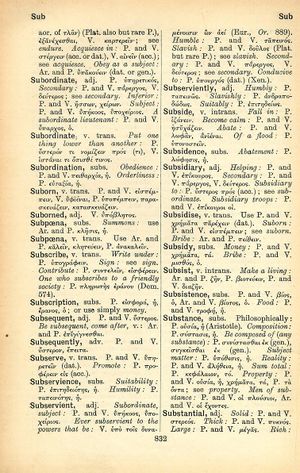subservient: Difference between revisions
From LSJ
(CSV5) |
m (Woodhouse1 replacement) |
||
| Line 1: | Line 1: | ||
{{Woodhouse1 | {{Woodhouse1 | ||
|Text=[[File:woodhouse_832.jpg|thumb|link={{filepath:woodhouse_832.jpg}}]] | |Text=[[File:woodhouse_832.jpg|thumb|link={{filepath:woodhouse_832.jpg}}]] | ||
===adjective=== | |||
[[subordinate]], [[subject]]: [[prose|P.]] and [[verse|V.]] [[ὑπήκοος]], [[ὑποχείριος]]. | |||
[[ever subservient to the powers that be]]: [[verse|V.]] [[ὑπὸ τοῖς δυναμένοισιν ὢν ἀεί]] ([[Euripides|Eur.]], ''[[Orestes]]'' 889). | |||
[[humble]]: [[prose|P.]] and [[verse|V.]] [[ταπεινός]]. | |||
[[slavish]]: [[prose|P.]] and [[verse|V.]] [[δοῦλος]] ([[Plato]] but rare [[prose|P.]]); see [[slavish]]. | |||
[[secondary]]: [[prose|P.]] and [[verse|V.]] [[πάρεργος]], [[verse|V.]] [[δεύτερος]]; see [[secondary]]. | |||
[[conducive to]]: [[prose|P.]] [[ὑπουργός]] (dat.) ([[Xenophon|Xen.]]). | |||
}} | }} | ||
Revision as of 08:52, 20 May 2020
English > Greek (Woodhouse)
adjective
subordinate, subject: P. and V. ὑπήκοος, ὑποχείριος.
ever subservient to the powers that be: V. ὑπὸ τοῖς δυναμένοισιν ὢν ἀεί (Eur., Orestes 889).
slavish: P. and V. δοῦλος (Plato but rare P.); see slavish.
secondary: P. and V. πάρεργος, V. δεύτερος; see secondary.
conducive to: P. ὑπουργός (dat.) (Xen.).

